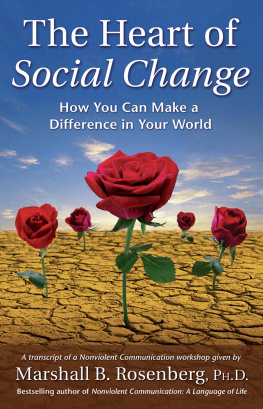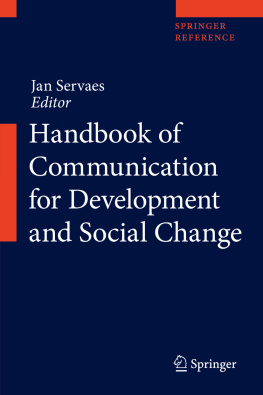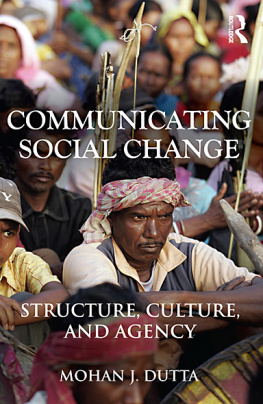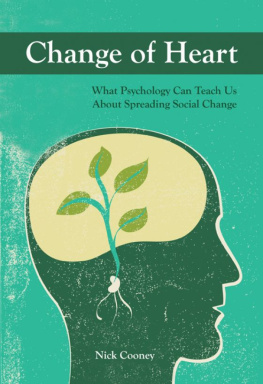FROM INTERVENTION TO SOCIAL CHANGE
Solving Social Problems
Series Editor:
Bonnie Berry, Director of the Social Problems Research Group, USA
Solving Social Problems provides a forum for the description and measurement of social problems, with a keen focus on the concrete remedies proposed for their solution. The series takes an international perspective, exploring social problems in various parts of the world, with the central concern being always their possible remedy. As such, work is welcomed on subjects as diverse as environmental damage, terrorism, economic disparities and economic devastation, poverty, inequalities, domestic assaults and sexual abuse, health care, natural disasters, labour inequality, animal abuse, crime, and mental illness and its treatment. In addition to recommending solutions to social problems, the books in this series are theoretically sophisticated, exploring previous discussions of the issues in question, examining other attempts to resolve them, and adopting and discussing methodologies that are commonly used to measure social problems. Proposed solutions may be framed as changes in policy, practice, or more broadly, social change and social movement. Solutions may be reflective of ideology, but are always pragmatic and detailed, explaining the means by which the suggested solutions might be achieved.
Also in the series
Preventing Human Trafficking
Education and NGOs in Thailand
Robert W. Spires
Service Sociology and Academic Engagement in Social Problems
Edited by A. Javier Trevio and Karen M. McCormack
Women, Incarceration, and Human Rights Violations
Feminist Criminology and Corrections
Alana Van Gundy and Amy Baumann-Grau
Regulating Alcohol around the World
Policy Cocktails
Tiffany Bergin
From Intervention to Social Change
A Guide to Reshaping Everyday Practices
TRIIN VIHALEMM, MARGIT KELLER AND MAIE KIISEL
University of Tartu, Estonia
First published 2015 by Ashgate Publishing
Published 2016 by Routledge
2 Park Square, Milton Park, Abingdon, Oxon OX14 4RN
711 Third Avenue, New York, NY 10017, USA
Routledge is an imprint of the Taylor & Francis Group, an informa business
Copyright Triin Vihalemm, Margit Keller and Maie Kiisel 2015
Triin Vihalemm, Margit Keller and Maie Kiisel have asserted their right under the Copyright, Designs and Patents Act, 1988, to be identified as the authors of this work.
All rights reserved. No part of this book may be reprinted or reproduced or utilised in any form or by any electronic, mechanical, or other means, now known or hereafter invented, including photocopying and recording, or in any information storage or retrieval system, without permission in writing from the publishers.
Notice:
Product or corporate names may be trademarks or registered trademarks, and are used only for identification and explanation without intent to infringe.
British Library Cataloguing in Publication Data
A catalogue record for this book is available from the British Library
The Library of Congress has cataloged the printed edition as follows:
Vihalemm, Triin, 1968
From intervention to social change : a guide to reshaping everyday practices / by Triin Vihalemm, Margit Keller and Maie Kiisel.
pages cm.(Solving social problems)
Includes bibliographical references and index.
ISBN 978-1-4724-5190-3 (hardback)ISBN 978-1-3155-8339-6 (ebook)ISBN 978-1-3171-3215-8 (epub) 1. Social problems. 2. Social action. 3. Social change. 4. Social policy. I. Title.
HN18.3.V54 2015
303.3dc23
2015000867
ISBN: 9781472451903 (hbk)
ISBN: 9781315583396 (ebk-PDF)
ISBN: 9781317132158 (ebk-ePUB)
Contents
List of Figures and Tables
Figures
Tables
Acknowledgements
In writing this book, the three authors did not walk alone. There were many companions we wish to thank most warmly: our colleague at the University of Tartu, Kadri Ugur, for giving constructive feedback, especially about the didactic aspects of the book; the masters students in communication management and medicine at the University of Tartu, on whom we tried out the earlier versions of the book; the international students from various disciplines at the University of Helsinki, who gave valuable feedback; and the local programme manager, Yonca Ermutlu, who helped us to arrange the courses.
Bente Halkier, Alan Warde, Terhi-Anna Wilska, Tally Katz-Gerro, Lydia Marters, Olga Kravets, Dale Southerton, Monica Truninger, Lotte Holm, Eivind St, Jukka Gronow, Michael Egerer, Irmak Karademir Hazir and Pekka Sulkunen deserve our deep gratitude for inspiring us to become involved in practice theory and providing examples of excellent analyses through their articles, books, conference presentations and, above all, friendly collegial support. The Sociology of Consumption Research Network of the European Sociological Association has been an international family for Margit Keller, who has had the honour of chairing this network for a few years. Its conferences have sparked many ideas that made this book possible.
We also wish to express our gratitude to numerous professionals at Estonian public institutions and civic organisations who have provided interesting data and projects to consult, work on and analyse: Viola Murd and Janek Innos at the Estonian Rescue Board, Hanna Turetski at the Consumer Protection Agency, Leonore Riitsalu and Heli Lehtsaar at the Estonian Financial Supervision Authority, Lauri Tammiste and Tanel Liiv at the Estonian Environmental Investment Centre and Rasmus Pedanik from the Social Innovation Network. We thank our students and members of our social practices research unit for their contribution in investigating various social change programmes and projects, and colleagues at the Institute of Social Studies of the University of Tartu for their inspiring questions and interest.
Our gratitude is due to Richard Adang, our English language editor, for his careful work. The artists Tanel Rannala and Siiri Taimla from Joonmeedia have brought the book to life with many original hand-drawings, which are an integral part of this books message. We would also like to thank Springtime industrial design BV, Reet Ruusmann and Anu Jrs from the Estonian National Museum and Helgi Pllo and Urmas Liit from Hiiumaa Museum and our friends Helen Ennok and Aare Abrams who helped us with photographs.
Ashgates editors Neil Jordan and Sadie Copley-May have always been positive and provided quick feedback.
The writing of the book has been funded by two research grants: IUT 2038 and ETF9017 from the Estonian Research Agency.
Preface
This book was mainly born out of the authors inspiration from a rapidly emerging and very intriguing strand of sociological thinking called theories of social practices, and out of disenchantment with individual-centred public awareness campaigns that ambitiously strive to transform behaviours and affect social change. According to the Encyclopaedia Britannica, Social change (n.d.) is the alteration of mechanisms within the social structure, characterized by changes in cultural symbols, rules of behaviour, social organizations, or value systems. Contemporary societies in various parts of the world abound in projects and programmes which attempt to effect change, to transform society, to make people think and act differently: in a healthier, more sustainable, innovative, responsible and capable way. We can think of such initiatives and interventions into peoples everyday lifestyles as social change programmes, which assume that social change can be galvanised and pushed in the desired direction if people are organised and make concerted efforts.







